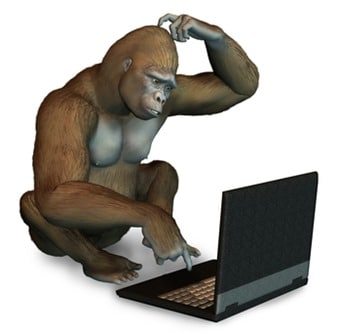Originally posted on September 27, 2014 @ 6:18 AM
 How can I know what I think or feel until I see what I say and do? – Prof. Karl E. Weick.
How can I know what I think or feel until I see what I say and do? – Prof. Karl E. Weick.
I recently supported a friend in attaining their Building and Construction White Card on the Internet. I found the experience quite troubling. As an educator with more than 35 years experience, there were some things which bothered me about the process.
In our quest to get tickets and aquire knowledge in safety we ought not lose sight of some essentials in learning and, some issues with elearning, these are:
- Learning is about much more than just acquiring knowledge. Head knowledge has value but until it is demonstrated in practice, it remains espoused theory.
- Learning is a social, contextual and ethical activity. One can learn all about safety but we don’t know if our theory is compatible with reality until it is tested in situ.
- Learning is a subjective experience. The way we learn, why we learn and what we believe are individual to us. Sensemaking is not held in common, neither can it be assumed.
- You can’t know what someone has learned just by asking them. You can say that safety is the first priority but this is meaningless until tested by the context of a trade off for risk. Most often production receives priority over safety.
- Correct comprehension knowledge at best targets parrot learning. Paulo Freire called this kind of knowledge “banking”. Many elearning courses are little more than a Powerpoint electronic book, with a quiz at the end. The Building and Construction White Card was like this. In this case one could obtain the White Card by trial and error guesses at the end. This is how my friend obtained his White Card.
- Humans cannot retain extensive amounts of information in one sitting. It doesn’t take much to flood human consciousness. Bombarding the senses with data over a number of hours cannot be absorbed. Real learning is both longitudinal and relational.
- Learning is inseparable from belief and change. Reciting answers to questions doesn’t establish belief or ownership. A computer cannot assess belief and ownership.
- Assessment for authenticity requires relationship and human engagement. A computer cannot interpret evidence.
- Apprenticeship learning, through mentoring and coaching where reflective practice applies, is effective learning. Demonstrated learning requires observation, interpretation and understanding.
- Elearning requires self motivation and self guidance. It assumes a high level of learning maturity including the ability to know, transfer and apply knowledge in context once leaving the classroom/computer.
These are just a few of the considerations we should be mindful of when chose elearning strategies to transmit and develop knowledge. I tend to think that elearning strategies are only good as supplements to other forms of relational learning.
I was researcher for a driver simulator program for young beginner drivers with the NRMA for 2 years. The aim of the program was to develop driver readiness and reduce poor driving habits, I was to research and evaluate program effectiveness. Every student passed the course with flying colours and in less than two weeks several had accidents for speeding. Even success on a simulator doesn’t assure very much or help manage testosterone.
During the Beaconsfield Crisis I observed the behaviors of some well trained people. Some of these people demonstrated that they neither believed nor had leaned anything about; fatigue, team work, heroics, safety, communication, altruism, stress, collaboration and risk management. Those who had learned about these things helped the rescue, those who had not learned about these things hindered the rescue. All the talk and theory in heads mattered very little when the right actions were required under intense pressure. Theory-in-use in a crisis is real demonstration of learning.
Whilst elearning programs trend and grow in popularity we need to be more than ever careful about what we can assume about the value of elearning for safety. Safety is more than just an idea or a collation of knowledge. Safety is essentially the outworking of what one believes.



Do you have any thoughts? Please share them below